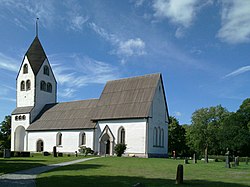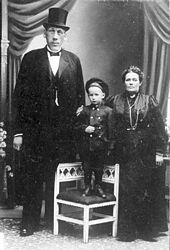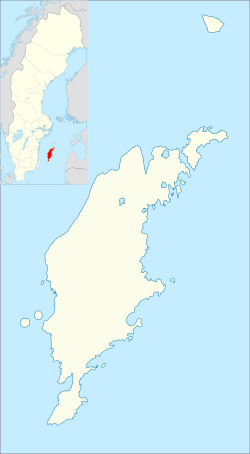Burs, Gotland
Burs
Buss (Gutnish) | |
|---|---|
 | |
| Coordinates: 57°15′03″N 18°30′43″E / 57.25083°N 18.51194°E | |
| Country | Sweden |
| Province | Gotland |
| County | Gotland County |
| Municipality | Gotland Municipality |
| Area | |
• Total | 42 km2 (16 sq mi) |
| Population (2014)[2] | |
• Total | 329 |
| Time zone | UTC+1 (CET) |
| • Summer (DST) | UTC+2 (CEST) |
| Website | www.burs.nu/forsta-sidan at the Wayback Machine (archived 2015-07-25) |
Burs (Swedish pronunciation: [ˈbɵʂː])[3] is a populated area, a socken (not to be confused with parish), on the Swedish island of Gotland.[4] It comprises the same area as the administrative Burs District, established on 1 January 2016.[5] As of 2015[update], Gustaf Edman from Burs was probably Sweden's tallest man.
Geography
[edit]Burs is the name of the socken as well as the district. It is also the name of the small 0.18 km2 (0.069 sq mi) village surrounding the Burs Church,[6] sometimes referred to as Burs kyrkby. Located on the southeast coast of Gotland it is a flat country.[1] Part of the farmland has been gained by draining the Rone and Lye mires, as well as the Lake Burs.[7][8]
As of 2019[update], Burs Church belongs to Stånga-Burs parish in Burs pastorat, along with the church in Stånga.[9][10]
One of the asteroids in the asteroid belt, 8681 Burs, is named after this place.[11]
Etymology
[edit]The name Burs is derived from burg meaning "gravel ridge" or "gravel ground".[12][8]
History
[edit]A hoard of 646 Roman denarii was discovered by farm workers, between Sigdes and Burs, which was published by numismatist Rosa Norström in 1907.[13][14][15]
Burs dates back to Medieval times. It is the name of a larger area surrounding the medieval Burs Church.[16] It was originally part of the Burs thing, which in turn was in the southernmost of the three original districts (similar to ridings) that Gotland was divided into during the Middle Ages. In 1862, it became an independent municipality. In 1952, it was incorporated into the Stånga municipality and in 1971, all of Gotland became one municipality.[17] The boatswains from Burs under the allotment system, were part of the Second Gotlandic Boatswains Company.[18]
Burs has a number of Bronze Age grave mounds and stone ships. The remnants from the Iron Age consists of about ten grave fields, house foundations, collapsed stone walls and grinding grooves.[7][8][19][20]
At Sigdes farm in Burs, there is a limestone ring-cross[21] dating from the later part of the 16th century.[22] According to one legend, it marks the place of an ancient battle. Another legend tells the story about a groom who died there. The cross is inscribed with and almost obliterated Latin text, which has been interpreted by L F Läffler: "This cross marks the place where Ragnvald, former vicar and now buried in Lau, was struck by death in the year of 1448 on Michael's day to whom You, oh almighty king may show kindness."[23] The cross have some runes chiseled on the back.[22]
The Giant
[edit]
Karl Gustaf Emmerik Edman (also known as The Giant) (4 February 1882 – 3 October 1912) born at Bondare in Burs and died in Finland, is probably Sweden's tallest man up to date. He is listed as the eleventh-tallest in the world in the Guinness Book of Records.[24] His parents were both of normal length. When he died he was supposedly 2.43 m (8 ft 0 in) tall and weighed 240 kg (530 lb). A photograph indicates that he was in fact 2.25 m (7 ft 5 in) His shoes in size 56 are still kept in a small museum in Burs. He started life as a farmhand and later toured with circuses and sideshows at markets. He married Anna Regina Edman from Jämtland and they had two children of normal size. He died of typhus during a tour in Finland, 30 years old.[25][26]
A wooden statue of Edman has been erected in Burs at the crossroads to Busskveia.[24] The statue was made by Armin Irwahn in 1996.[27]
References
[edit]- ^ a b Carlquist, Gunnar (ed.). Burs socken. Malmö: Svensk uppslagsbok–Baltiska förlaget.
- ^ "Gotland i siffror" [Gotland in numbers]. www.gotland.se. Gotland Municipality. Archived from the original on 30 January 2018. Retrieved 22 July 2015.
- ^ Jöran Sahlgren; Gösta Bergman (1979). Svenska ortnamn med uttalsuppgifter (in Swedish). p. 6.
- ^ The exact extent of the socken, now district, can be obtained by clicking on Kartinställningar and check the Socken box in the menu of this map from the Swedish National Heritage Board database.
- ^ "Förordning om district" [Regulation of districts] (PDF). Ministry of Finance. 17 June 2015. Archived from the original (PDF) on 30 September 2018. Retrieved 24 May 2016.
- ^ "Småorternas landareal, folkmängd och invånare per km2 2005 och 2010, fortsättning" [Statistics area, population, 2005 and 2010] (PDF). www.scb.se. Statistics Sweden. p. 23. Retrieved 22 July 2015.
- ^ a b Sjögren, Otto, ed. (1931). Sverige: geografisk beskrivning [Sweden: a geographical description] (in Swedish). Stockholm: Wahlström & Widstrand.
- ^ a b c Bergman, Mats; Edlund, Lars-Erik; Selinge, Klas-Göran. "Burs". www.ne.se (in Swedish). Nationalencyklopedin.
- ^ "Församlingar på Gotland". www.svenskakyrkan.se. Church of Sweden. Retrieved 12 January 2019.
- ^ "Visby stifts indelning 2018". www.svenskakyrkan.se. Church of Sweden. Retrieved 12 January 2019.
- ^ "8681 Burs (1992 EN9)". NASA. Retrieved 27 June 2016.
- ^ Wahlberg, Mats, ed. (2003). Svenskt ortnamnslexikon [Swedish location names dictionary] (in Swedish). Uppsala: Språk- och folkminnesinstitutet (SOFI). ISBN 91-7229-020-X.
- ^ American Journal of Archaeology. Archaeological Institute of America. 1909.
- ^ Lind, Lennart (2018). Roman Denarii: Hoards and Stray Finds in Sweden (PDF). Stockholm Numismatic Institute. p. 13.
- ^ Norström, Rosa. "Romerskt myntfynd från Sigdes i Burs socken, Gotland." Fornvännen 2 (1907): 202-203.
- ^ Lagerlöf, Erland; Svahnström, Gunnar (1973). Gotlands kyrkor [Gotland's Churches] (in Swedish). Stockholm: Rabén & Sjögren. pp. 110–112. ISBN 91-29-41035-5. SELIBR 7232718.
- ^ Harlén, Hans; Harlén, Eivy (2003). Sverige från A till Ö: geografisk-historisk uppslagsbok [Sweden from A to Z: geographical and historical encyclopedia] (in Swedish). Stockholm: Kommentus. ISBN 91-7345-139-8.
- ^ Högman, Hans. "Gotlands båtsmanskompanier". www.algonet.se. Hans Högman. Retrieved 4 July 2015.
- ^ Gannholm, Sören. "Förteckning över de gotländska slipskårorna KL" [List of Gotland grinding grooves KL]. www.stavgard.com. Retrieved 23 July 2015.
- ^ "Go, Burs socken". www.historiska.se. Swedish History Museum. Retrieved 23 July 2015.
- ^ "Stenkors vid Sigdes i Burs" [Stone cross at Sigdes in Burs]. www.raa.se. Swedish National Heritage Board. Retrieved 23 July 2015.
- ^ a b "RAÄ-nummer Burs 65:1". www.raa.se. Swedish National Heritage Board. Retrieved 23 July 2015.
- ^ Klint, Egon (1996). Boken om Burs [The book about Burs] (in Swedish). Visby: Ödin/Hanseproduktion. ISBN 91-85716-77-4.
- ^ a b Enderborg, Bernt. "Inte alla är små feta gotlänningar" [Not all Gotlanders are small and fat]. www.guteinfo.com. Guteinfo. Retrieved 24 July 2015.
- ^ "Gustaf Edman". www.thetallestman.com. The Giant website. Archived from the original on 23 November 2014. Retrieved 24 July 2015.
{{cite web}}: CS1 maint: unfit URL (link) - ^ Broberg, Rolf (25 August 1997). "Jätten Edman åter i Burs" [Edman the Giant back in Burs]. www.dn.se. Dagens Nyheter. Retrieved 24 July 2015.
- ^ "Jätten Edman" [Edman the Giant]. www.burs.nu. Burs Heritage Society. Retrieved 24 July 2015.


